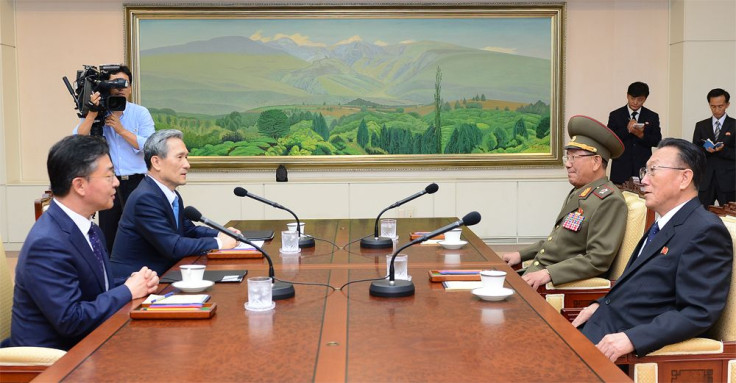North Korea, South Korea Talks On Jan 9: What To Expect

North Korea and South Korea agreed Friday to hold high-level talks next week in a decision that is being seen as a door to discussing topics such as the upcoming Winter Olympic Games and ways to better ties.
South Korean news agency Yonhap News cited South Korea Unification Ministry saying, North Korea accepted the latest offer by Seoul to hold talks and the date was decided as Jan. 9.
The talks, which are the first round of inter-Korean dialogue since December 2015, will reportedly take place at Panmunjom, the "peace village," along the border between the two countries in the heavily guarded demilitarized zone (DMZ).
"The two sides decided to discuss working-level issues for the talks by exchanging documents," said Baik Tae-hyun, a spokesman at the ministry. The North's decision to agree to the talks comes after Kim Jong Un, in his New Year speech, expressed willingness to send a delegation to the Winter Olympics to be held in the South next month.
Pyongyang gave its final nod of approval Friday after U.S. President Donald Trump and South Korea President Moon Jae-in in a phone conversation Thursday agreed to delay their joint military drills that were to be held during the Winter Olympics.
North Korea regarded the joint military exercises as a rehearsal for invasion and previously said they were an obstacle in the way of improving inter-Korean ties.
During their conversation Thursday, Moon and President Donald Trump agreed to continue the U.S.-led campaign of maximum pressure against North Korea and "not to repeat mistakes of the past."
According to Yonhap, the first priority of the upcoming talks was expected to be North Korea's participation in the PyeongChang Winter Olympic Games. An unnamed official working at the Cheong Wa Dae — the office and official residence of the South Korean head of state — said: "The priority is on North Korea's participation in the PyeongChang Winter Olympic Games."
He added that the discussion might be succeeded by talks on how to improve inter-Korean relations. "I believe there will be discussions related to improving South-North ties after the North's participation in the Olympics becomes final," he said.
Baik also told reporters: "There is no change in the government's stance that along with efforts to restore inter-Korean ties, Seoul will consistently push for North Korea's denuclearization together with the international community."
"We will prepare for talks, based on close coordination with the U.S. and relevant countries," he added. International sanctions were imposed on the North following its increasing nuclear and missile threats. Seoul hoped the talks would act as a starting point for the resolution of North Korea's nuclear issue and broader talks between the U.S. and North Korea, Yonhap stated.
"The government has a basic stance that it will prepare for the events in a way that North Korea's participation in the games does not violate international sanctions including Washington's unilateral punitive actions," the unnamed spokesman told Yonhap.
The U.S. State Department dismissed the talks as limited, with department spokeswoman Heather Nauert saying Thursday: "Our understanding is that these talks will be limited. These talks will be limited to conversations about the Olympics and perhaps some other domestic matters ... not beyond that. This is not something where the Republic of Korea (South Korea) is going to go off freelancing or having lots of conversations with them."
While the response by the U.S. to the talks was lukewarm, President Donald Trump attempted to take credit for the improvement in ties before the talks were even announced.
© Copyright IBTimes 2025. All rights reserved.





















